Graham Reid | | 8 min read
Shakey Graves: Dearly Departed (w Esme Patterson)
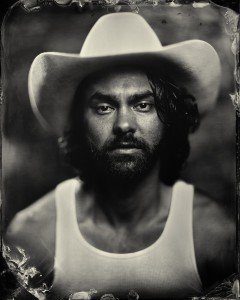
In a little over three years, Alejandro Rose-Garcia – better known as Shakey Graves – has carved out the almost perfect and throughly contemporary career arc.
Setting aside his occasional acting jobs where his boyish good looks got him small parts on the big screen, and a four-week role as the life-guard/love interest in the television series Friday Night Lights, the Austin-born singer-songwriter has made steady climb.
After trying his hand in New York and Los Angeles, he returned to Austin and started again. He played as a one-man band with a kick drum made from a suitcase, and recorded a debut album Roll the Bones in 2011 which he put out on bandcamp as free or pay-what-you-like.
His sound – a kind of burnt-edge soulful blues applied to country-rock – gained immediate attention and the touring life took of. Each tour took him up a notch and he became a fixture at his hometown's SXSW and on festival bills. Reviewers frequently spoke of the visceral power he brought to his performances.
Last year's album And the War Came widened his musical scope and Graves – who plays Auckland's Tuning Fork on February 28 – has been candid about laying down the foundations for a sustainable career.
Astute, from an artistic family (mother an actor/director, father a theatre manager) and focused, he works social media with humour, offers his followers bonus material and brief access to his music for free, and has done live sessions for Spotify.
When Elsewhere spoke to Shakey Graves – a fanciful name thought up by pals while on a camping trip – he was back home in Austin after a three month US tour with his band and we greet him as “Shakey, Mr Graves or Alejandro?”
“I'll respond to it all,” he laughs.
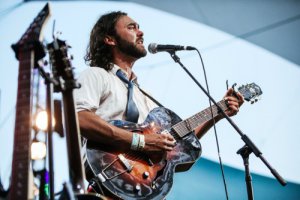 So how did the tour go?
So how did the tour go?
It went really well, we sold out almost every show and it was a huge learning experience. It was definitely a bump-up from the last tours we'd done as far as capacity and the rooms we were playing. It was a whole different game.
A bigger room means a slightly more anonymous audience in front of you, did you notice how that changed what you did?
It has good and bad sides, the smaller an audience the more intense it can be sometimes. And if they're not feeling it then you notice it. But with the bigger audience it can be easy to just glaze over and do your thing. But it's fun to play a huge room and the responses have been interesting, some night it's been chaos and other nights you can hear a pin drop.
Can you anticipate that before you go on?
Not really. I feel like some part of me has a little bit of control over that sometimes, it depends on what foot I lead with when I kick the show off. But we've had shows at certain places, in Chicago for instance, where it was just utter chaos, total insanity with people drunk and crazy the last two times. So this time we were like,”Okay, here it comes, the Chicago freaks'. And it was the quietest gig, silent, a hanging-from-every-word audience in a bigger room. The audience had changed and I don't know why.
Could you attribute that to people actually wanting to hear what you have to say now?
I hope so (laughs)
Otherwise it's all been a bit of waste really.
(laughs) Yeah, people sitting their scratching their heads and wondering what the hell is going on.
You went out with a band?
Partially. I won't be able to bring the whole band to New Zealand though. I'd start solo just by playing acoustic or doing the one-man band thing and slowly built it up and bring people on one by one.
It was fun because I've been working with the producer/drummer Chris Boosahda for a while, we did the album together so we did some duo stuff. Then we did this thing with my friend from California who is a guitar player. We would plant him in the audience and say, 'Does anyone know this one song?” and he's yelling, 'I do, I do'.
So it's 'Do you know it on guitar?' and he's like, 'Yeah, yeah' and so we'd get people to crowd surf him onto the stage and he'd pick up the guitar and pretend he didn't know what he was doing . . . and then hit every harmony and stay up for the rest of the show.
You like that idea of performance as entertainment.
Yeah, I do and that was one of the funnier things to do and see how audiences handled it. Some people never got it was a joke like, 'That was insane, I can't believe that dude came out of the audience'. What? And proceeded to do six songs in a row?
Other people were onto it in a second and some people felt totally gypped by it, 'Oh. that's fake' and I'm like, 'But that's fun'. It definitely breaks the mood, like a well-placed fart would.
I've always tried to do that a little bit. I like being really serious but at the same time this is just music so you might as well have fun doing it.
I know that you have been in and out of acting so is to some extent Shakey Graves the act that you do?
Yeah, and that's why it has this name in the first place. It gives me a wall to hide behind when I need to and also a platform to stand on. As far as songwriting is concerned it's a nice tool in that I don't have to worry in writing about my own personal experiences, and that it gives me more freedom to explore weird sounds.
I don't know where this Shakey project is going because at the end of the day it is that, it is a project. It could be just me, it could be more than that, it could just be me and flute.
I read an interesting interview with you when you spoke very seriously about the idea of A Career, and you said you'd looked at how other people like Tom Waits and Neil Young got careers. Where do you see yourself in your career at this point?
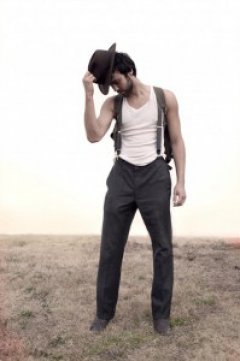 There's two sides to that, the one is
the building of the touring machine, and that's a part of a lot of
people's careers. A lot of bands don't get to make it to which is a
real shame. But meeting other people out there doing the same thing,
that has more of a wartime sense than anything. You and four boys or
young men piling together and driving through everything and keeping
each other not too drunk and on time, unloading big crates of
important sword-like guitars.
There's two sides to that, the one is
the building of the touring machine, and that's a part of a lot of
people's careers. A lot of bands don't get to make it to which is a
real shame. But meeting other people out there doing the same thing,
that has more of a wartime sense than anything. You and four boys or
young men piling together and driving through everything and keeping
each other not too drunk and on time, unloading big crates of
important sword-like guitars.
On that side I've gotten to go from touring by myself in a Toyota Corolla to moving into a van that we put a bed in as a two-man operation with my best friend and tour manager. We'd do merchandising and we'd sleep in that, and we'd sleep in Wal-Mart parking lots.
And this year we've moved up to a Sprinter and next year it looks like we might need to get into a bus. On the touring/fighting side I see a logical progressing.
But as far as putting out albums I think I'm at a point in my career where I'm excited by what I've done and I'm at that turning point where I have to show up for work . . . and start deciding what kinds of shows I want to do. Do I want it more intimate, or bigger?
But essentially I've done it all so far and so it's my choice now and I'm in a pivotal seat. The next album I put out will be very much a statement. It needs to be.
So you get the Willie Nelson touring bus . . . but I know you've been a big fan and user of bandcamp and Spotify to get your music out there, and you've been active in giving fans extra material and free access to your music. You think that might have to change as well?
I'd hope not, but at a certain point you have to ask what you really want out of everything. I've tried to keep my overheads really low. It's amazing what things cost. You never think about how much it costs to print vinyl for example until you do it, and then you forget that it shows up on a huge palette at your house.
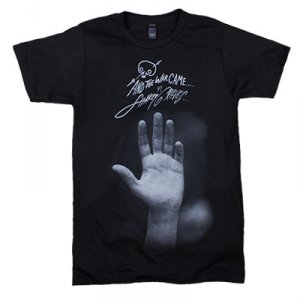 So my house is full of me stuff, like
hats and records . . . Just shit everywhere. It's 'be careful what
you wish for'.
So my house is full of me stuff, like
hats and records . . . Just shit everywhere. It's 'be careful what
you wish for'.
I'm happy to break even to get people on board. I feel very lucky and blessed to not only have a job making music but that actually people will pay attention to.
I'm not putting out bonus material into the wind either, people are really excited about it.
I'm not trying to squeeze a dime out of anybody but again, it's been miraculous what happened through bandcamp.
That first album was pay-what-you-want and it stayed liked that. And I intend to keep it like that, hopefully forever. There's an amazing thing where if you offer something for free and someone pays for it they really feel a sense of responsibility for that object.
That's why I think it is important to pay for stuff.
Spotify is amazing because we've had like five million listens on one song, which is impossible without Spotify. On the other it becomes so easy . . . the way I listen to stuff on Spotify is that is just passes right through you.
It's as important to give stuff away for free as it is to pay for it, and I'm going to try and keep that balance.
With that first album and pay-what-you-want. Financially did that work for you, or was that not the point? It was to get your music out there?
Financially it worked tremendously, but again that has to do with where I was at the time. At that point I really just needed to pay rent and it did exactly that. It gave me a slow but constant stream. I would make anywhere from $50 to $100 a day from that. That's not bad at all. One out of every five people would pay $10 and the other four will take it for free.
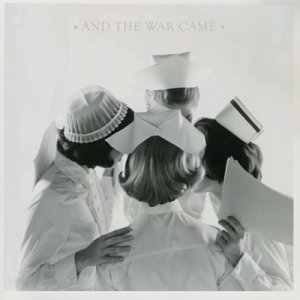 The album from last year When the War
Came seemed to me an important transitional work, just wider and
deeper if I can use such stupid words. Is that how you see it?
The album from last year When the War
Came seemed to me an important transitional work, just wider and
deeper if I can use such stupid words. Is that how you see it?
Yeah, and that was entirely intentional. I'm trying to widen the spectrum of what people can expect from me in the future and I'm at that horizon now because it makes me excited about the next thing I put out. I can go back and take it down, or take it bigger. And I don't think it would be taken in the wrong light.
Because you've already made prior statements along whatever line, so people have a reference point?
Exactly. It has more continuity. And that's what I see in that career mentality. I do like things to be seen, and a body of work.
Last one, you are coming down here and doing solo shows. You don't mind doing that, you don't see it as a retrograde step?
Oh God no. I'm actually bringing out my drummer because Jim and I can cover more ground. The reason I have a band is simply that there are certain songs I cannot play by myself and achieve that certain sound. I don't mind changing it up and going back to the one-person thing. The two-person thing is the bare minimum we can get on some songs like The Certain Part and Family And Genus.
You still play the kick-drum?
Yeah I do. The drum will be coming.


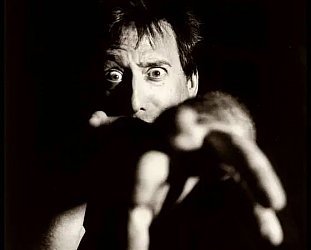
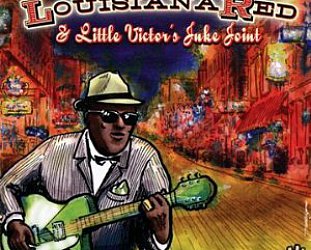
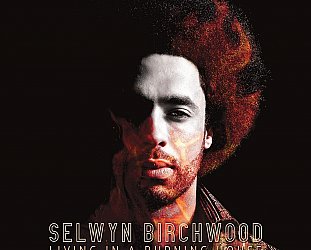
post a comment